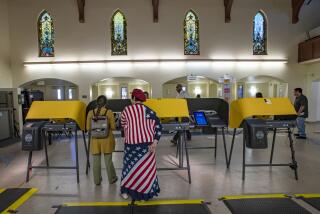POLITICS : For Many in the Media, Hotline Is a Must-Read Daily Source : Publisher sees it as voice of diversity. Critics say it can reinforce the herd mentality.
- Share via
ALEXANDRIA, Va. — A scant 10 minutes past his 11:30 a.m. deadline, Hotline Publisher Robert Balkin scampered down three sets of stairs and into a basement control room. As Balkin and a computer expert tried to unravel a mechanical glitch, tiny red lights flickered impatiently on a stack of black metal boxes nearby.
“Those are our readers,” Balkin explained breathlessly. “They’re wondering where we are.”
The red lights flashed and died, ignited and faded as members of the political Establishment tried to get “The Daily Briefing on American Politics” hot off the Hotline’s high-speed computer. Finally, at exactly 11:45 a.m., the day’s Hotline was liberated into cyberspace. By 11:46 a.m., the Heritage Foundation and the U.S. Information Agency had already logged on for their copies. At 11:47, the Chicago Tribune and the Environmental Protection Agency were among those downloading 22 pages of political tidbits, with Newsweek, Rush Limbaugh and the New York Times getting theirs by 11:49.
Whether it brings news of who really won the presidential straw poll in Florida or which side blinked in the federal budget battle, the daily Hotline for the last eight years has been a strong force that informs and unifies the political community, particularly the media. As a kind of hometown daily for an estimated 12,000 political insiders, the Hotline also provides a clue about why the media tends to stampede in the same direction, to follow the same trends, the same stories.
In the eyes of its publisher, the Hotline is a force for democracy within the nation’s press corps. By quoting those from outside Washington or New York, the Hotline “has brought a lot more diversity and many different voices into the conventional wisdom,” Balkin argues.
Others, however, see its influence as more constricting, increasing the tendency of reporters and editors to all head in the same direction simultaneously. “Most people are essentially lazy, and if you can give them a shortcut, they’ll use it,” says Everette Dennis, executive director of the Freedom Forum Media Studies Center at Columbia University in New York. “If you can say, ‘Come to my Kmart and I’ll give you everything you need,’ they’ll come.”
The Hotline “can make reporters lazy and pundits all too similar, and it is galling to hear someone on Sunday regurgitating Friday’s Hotline,” says Tim Russert, host of NBC-TV’s “Meet the Press” program. Still, he adds, the best political reporters and consultants “use it as a resource and not a crutch.”
For the company’s founders, political consultants Doug Bailey (a Republican) and Roger Craver (a Democrat), the dependency on the Hotline by journalists and campaign consultants is exactly what they had in mind when they began the Hotline in September, 1987.
Back then, in what seemed like the dawn of cyberspace, computers were slow and clumsy, the information highway still on the horizon. Many clients got the package by fax or even in the mail. (A few still do.)
Today, with most readers receiving the publication by noon EST, at prices that begin around $4,000 per client, the Hotline manages to do the hard work of digesting news stories so that the politically savvy can say they have heard of a long article or a TV show, even if they have only read a blurb about it. And some scan the Hotline for good political headlines, a striking image or simply the day’s insider joke to take to lunch.
A recent Hotline, for example, noted that Senate Majority Leader Bob Dole (R-Kan.) could not make it in person to the Republican Governors’ Assn. meeting in Nashua, N.H. As a result, Dole spoke by satellite, “which made him look like a giant peeking in through a 12th-story window,” according to the Concord (N.H.) Monitor.
The quote of the day came from Sen. Arlen Specter (R-Pa.), who was in the process of suspending his presidential quest. He told the Philadelphia Daily News: “I would have kicked myself in the ass if I hadn’t tried.”
Schedules for the candidates were listed, as well as the latest polls. There was also a long takeout from the Portland Oregonian about that state’s Democratic Senate primary race, in which Democratic Rep. Ron Wyden is struggling. Wyden’s star, the Oregonian noted, lost a good deal of luster when he was the only candidate who fared poorly on a news quiz. Among other flubs, he did not know where Bosnia is located.
The process of marshaling all these media tidbits into the Hotline begins each weekday before dawn. It involves what Bailey calls “a jerry-built collection system,” carried out by 12 full-time editorial staffers. On a stormy morning recently, three staff writers are already at work by 6 a.m., dismantling stacks of newspapers on tables before them.
Their work room, with high ceilings and low-budget furniture, features a balanced mix of political placards and a few aging political photos, including one of President Richard Nixon meeting Elvis. Three fax machines whine and spit along one wall as they deliver copies of stories from newspapers that would not be available in the East for hours or even days.
At a television set nearby, Researcher Doug Mintz speeds through tapes of news programs and late-night talk shows, stopping for Jay Leno’s jokes, David Letterman’s Top Ten list. The snipping of scissors and whirring of machines makes the Hotline newsroom sound like a small tailor’s shop.
Ron Eckstein, a 25-year-old former New Yorker, is busily distilling the New York Times into six stories. Robin Brown, 23, snips through the Washington Times with a speed that would make any newspaper editor wince.
“We’re here because we love politics,” Eckstein says with a laugh. “If it wasn’t fun, we wouldn’t put ourselves through it every day.”
The young staff labors under what Bailey calls “the campaign work ethic,” which means long hours, low pay, “your basic no-lifer,” as one staff member says with resignation. It is a job that is good for one political season, at the most two--often a good route to a job in politics or television. “What they do is fun,” Bailey says, “but only for people who are quite, quite young.”
Indeed, it looks like fun, even as they move closer to deadline and shift into overdrive. As they work, they toss computer disks back and forth across the room.
In the process, a Chicago Tribune clip is discarded as “same old, same old.” A Washington Post story on the missing husband of Rep. Enid Greene Waldholtz (R-Utah) provokes a search for something printed in her home state.
“Ah, we’ve got the Salt Lake Tribune,” Rudin says gleefully as he spots a version of the story.
Each week, more writers and editors figure out how to submit their work by computer. And regardless of how the material is sent, more than a few journalists call to read Balkin their latest efforts in hopes that the Hotline will have room for a mention.
“One of the best examples I know of how reporters view the Hotline was what happened after the L.A. Times cut its Washington Edition,” said Balkin, referring to The Times’ decision this summer to halt the East Coast version of its paper (the edition was restored earlier this month).
“There was a direct correlation: When they dropped the Washington Edition, the [calls] from the L.A. Times picked up considerably.”
“In the minds of a lot of reporters,” says Balkin, “Hotline validates their work.”
(BEGIN TEXT OF INFOBOX / INFOGRAPHIC)
The Players
A periodic look at the behind-the-scenes aides, consultants, media members and institutions shaping the course of the 1996 presidential campaign.
The Hotline
Founded: September, 1987, by Roger Craver, a Democratic political consultant, and Doug Bailey, a Republican consultant.
Daily readers: About 12,000, rising to an estimated 15,000 as elections near.
Subscription cost: $4,000 and up a year.
Employees: 25 total; 12 editorial.
More to Read
Get the L.A. Times Politics newsletter
Deeply reported insights into legislation, politics and policy from Sacramento, Washington and beyond. In your inbox twice per week.
You may occasionally receive promotional content from the Los Angeles Times.










